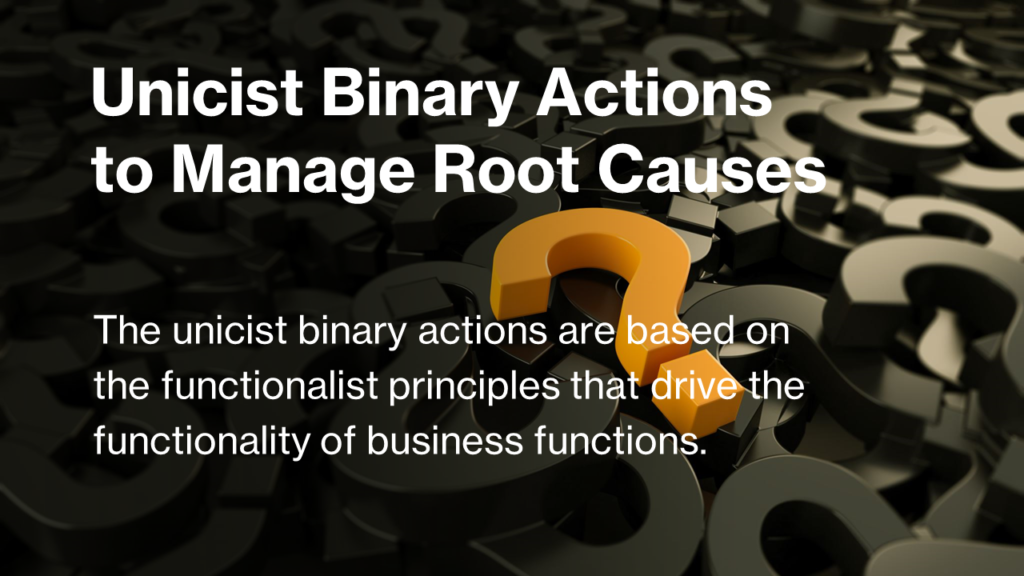The Unicist Functionalist Approach in the 4IR
The Unicist Conceptual Protocols are based on the unicist functionalist approach and were developed to provide structural solutions for businesses. As part of our partnering policy, the unicist technologies are licensed under a Creative Commons Attribution 4.0 International License.
These protocols provide the tools, drivers and catalysts to build adaptive business solutions. The use of these protocols requires having the necessary functional knowledge to manage the know-how and the know-why of business functions and processes.
The Unicist Functionalist Approach to business is based on the emulation of the organization of nature. Nature is essentially organized by processes, roles and objects and the unicist approach emulates this organization in businesses.
The Unicist Functional Design Method is the method that allows building adaptive systems, and solutions of any kind. It uses a unicist ontological approach that allows developing the conceptual design of adaptive entities.
It is also included in the Unicist Extreme Design Method and is supported by the protocols that are required by the specific solution that is being designed. It is also sustained by expert systems that simplify the design of actions and business objects.
The Unicist Conceptual Protocols
- Unicist Conceptual Designer Protocol
- Unified Field Protocol
- Destructive Testing Protocol
- Conceptual Engineering Protocol
- “Q” Method (Protocol)
- Root Cause Finding Protocol
- Unicist Reflection Protocol
- Complexity Learning Protocol
- Unicist Evolutionary Approach Protocol
- Ontological Reverse Engineering
- Adaptive Systems Research Protocol
- Extreme Design Protocol
- Marketing Strategy Protocol
- Object Driven Marketing Protocol
- B2B Conceptual Segmentation Protocol
- B2C Conceptual Segmentation Protocol
- Market Catalyzing Protocol
- Conceptual Benchmarking Protocol
- Strategy Building Protocol
- Organizational Strategy Protocol
- People Management Protocol
- Future Research Protocol
- Unicist Artificial Intelligence
Developments
Main Markets
• Automobile • Food • Mass consumption • Financial • Insurance • Sports and social institutions • Information Technology (IT) • High-Tech • Knowledge Businesses • Communications • Perishable goods • Mass media • Direct sales • Industrial commodities • Agribusiness • Healthcare • Pharmaceutical • Oil and Gas • Chemical • Paints • Fashion • Education • Services • Commerce and distribution • Mining • Timber • Apparel • Passenger transportation –land, sea and air • Tourism • Cargo transportation • Professional services • e-market • Entertainment and show-business • Advertising • Gastronomic • Hospitality • Credit card • Real estate • Fishing • Publishing • Industrial Equipment • Construction and Engineering • Bike, motorbike, scooter and moped • Sporting goods
Country Archetypes Developed
• Algeria • Argentina • Australia • Austria • Belarus • Belgium • Bolivia • Brazil • Cambodia • Canada • Chile • China • Colombia • Costa Rica • Croatia • Cuba • Czech Republic • Denmark • Ecuador • Egypt • Finland • France • Georgia • Germany • Honduras • Hungary • India • Iran • Iraq • Ireland • Israel • Italy • Japan • Jordan • Libya • Malaysia • Mexico • Morocco • Netherlands • New Zealand • Nicaragua • Norway • Pakistan • Panama • Paraguay • Peru • Philippines • Poland • Portugal • Romania • Russia • Saudi Arabia • Serbia • Singapore • Slovakia • South Africa • Spain • Sweden • Switzerland • Syria • Thailand • Tunisia • Turkey • Ukraine • United Arab Emirates • United Kingdom • United States • Uruguay • Venezuela • Vietnam






